More than 100,000 downloads and 10,000 users in the first month—these are results of Occaz, a French inspection app for used cars.
Our clients wanted to digitize their car inspection business with apps for iOS and Android and an advanced CRM system. They started with an app MVP with basic functionality, then decided to improve it and contacted us.
In this case study you’ll learn about design and development challenges on the project and business goals that Occaz helps to achieve its founders.
The Story Behind Occaz
Occaz is a car inspection app for used vehicles like cars, motorcycles, scooters, and so on. The app allows everyone to check a car’s technical state before buying it— the interior, exterior, and engine condition.
The app is targeted at French users who are thinking about buying or selling a vehicle. Users can also get an official vehicle registration document—**'carte grise'**—via the app and choose a warranty plan.
Occaz team contacted us with a request to create mobile apps for digitizing their car inspection business. Our clients already had a working MVP of the future app with the basic design and little functionality.
The prototype was an offline tool allowing users to check the car's characteristics. Users had to enter basic info about their vehicles (mileage, displacement, region) to get the cost of car inspection services.
Our job was to turn the prototype into iOS and Android apps and make custom UI/UX designs for both apps. Plus, create an admin panel where Occaz managers would process customer's applications and work with documents.
Occaz app offers two types of plans, a free and a paid one:
- As a free service, the app allows users to check the car's state (interior, exterior, engine) and prepare recommendations based on that information.
- As a paid service, Occaz helps with car registration (pay registration taxes and get a registration certificate directly in the app), the sale-buy process, and offers four warranty plans.
The car inspection process itself was a bit technical and complicated as our clients had to adapt to many French government processes. The information users entered had to be precise since it was being sent to the government API.
How We Began Working on Occaz
Our Business Analysts started by gathering the client's requirements regarding:
- The purchase system
- Events system (action A triggers event B)
- Questions for the inspection and reports generation
- Custom document template processing
As we were creating mobile apps from scratch, we had to prepare both documentation and UI/UX design.
We wrote the project specification with user stories and tech requirements and prepared a test plan.
As for the visual part, we created wireframes, designed the app screen by screen, and made a style guide to keep all the UI elements in one place.
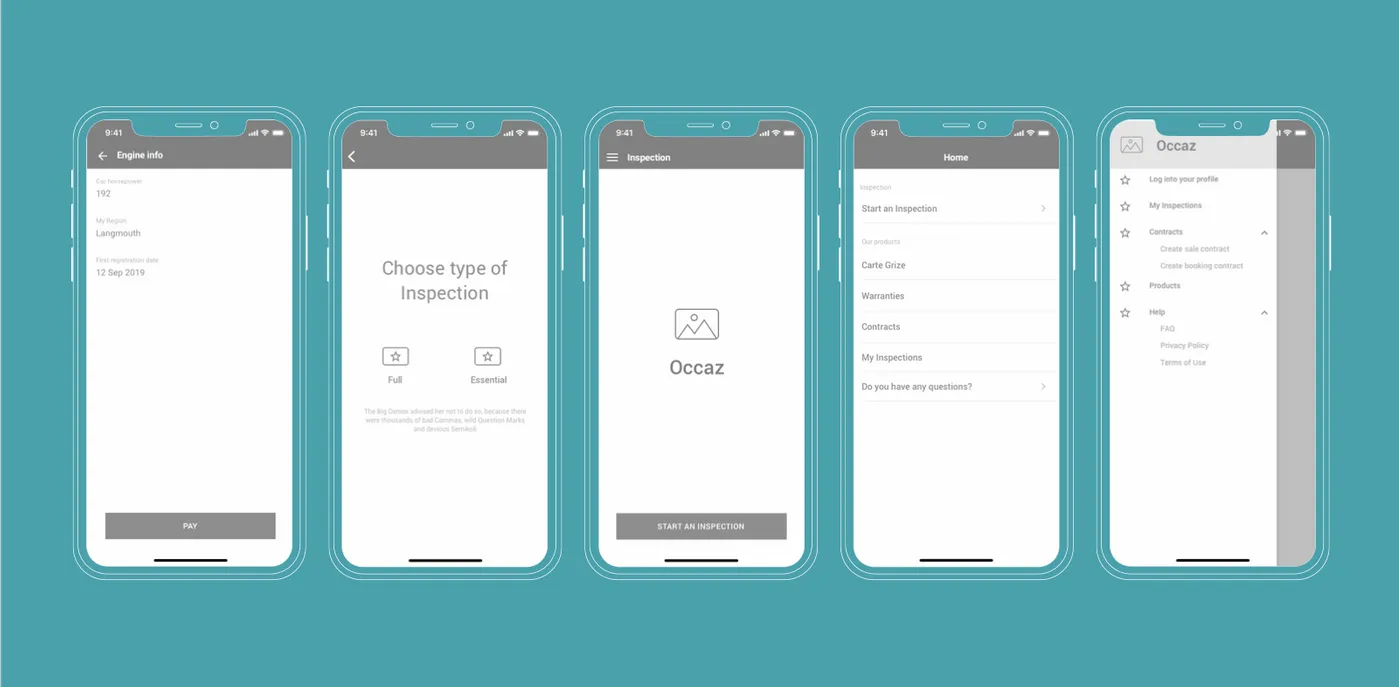
Occaz app wireframes
Since Occaz app deals with official documents, the information users enter must be precise. There's a lot of 'paperwork' to be done in the app, so our design team made the process look more straightforward and engaging:
- We added colorful thematic illustrations for each stage
- Created a clear main screen (menu) in the form of cards
- Made the document upload (passport, license) more convenient. Users can take pictures of their docs directly in Occaz, and the app instantly loads them.
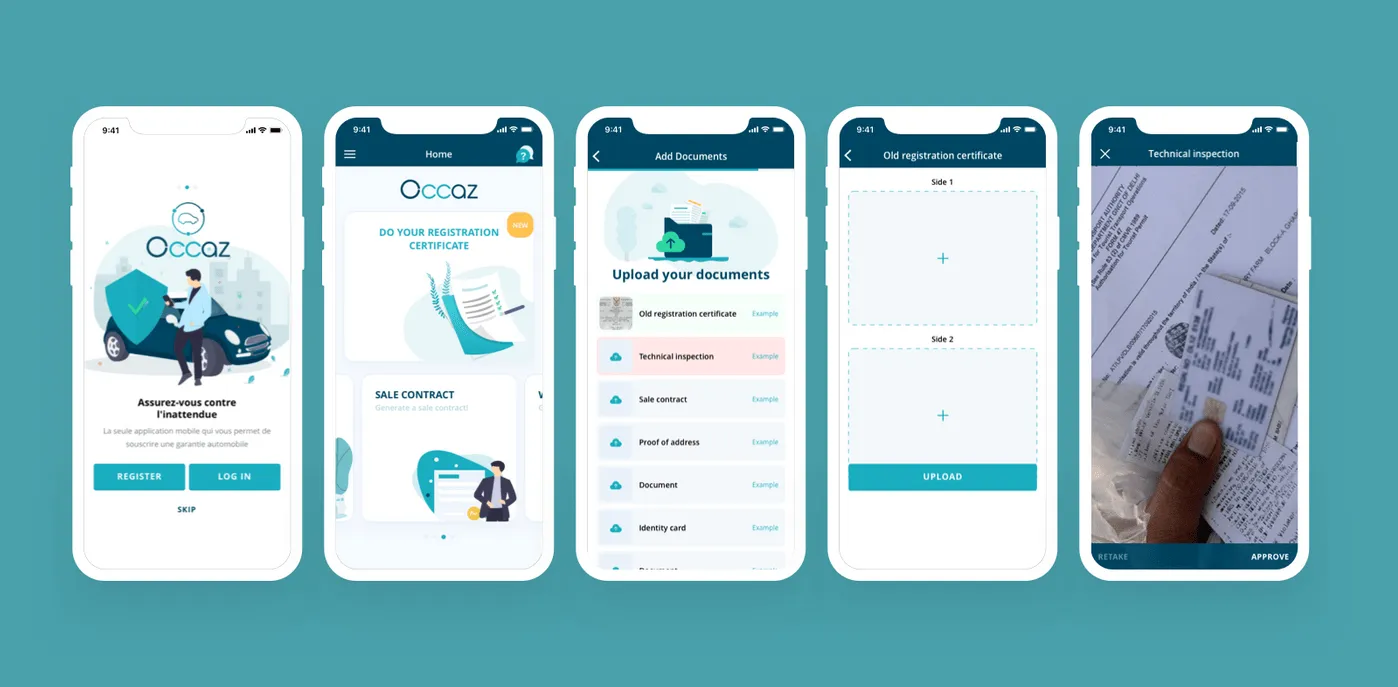
Occaz design solutions: illustrations, menu, doc uploading
The Development Process
We approved the design with our clients and got down to sprint-by-sprint development.
Dmitriy Krivosheya
Project Manager
We were mainly focused on Android and iOS apps first. The admin panel was supposed to be an addition to them but turned out to be the key part of the implemented scope. In fact, that's where the main part of work gets done, where Occaz managers process clients' applications and work with documents
We used Angular and Inspinia for the admin panel, Swift and Kotlin for iOS and Android apps. Stripe was used for secure payments, Facebook SDK for easy login, and PDF generator to let users make templates.
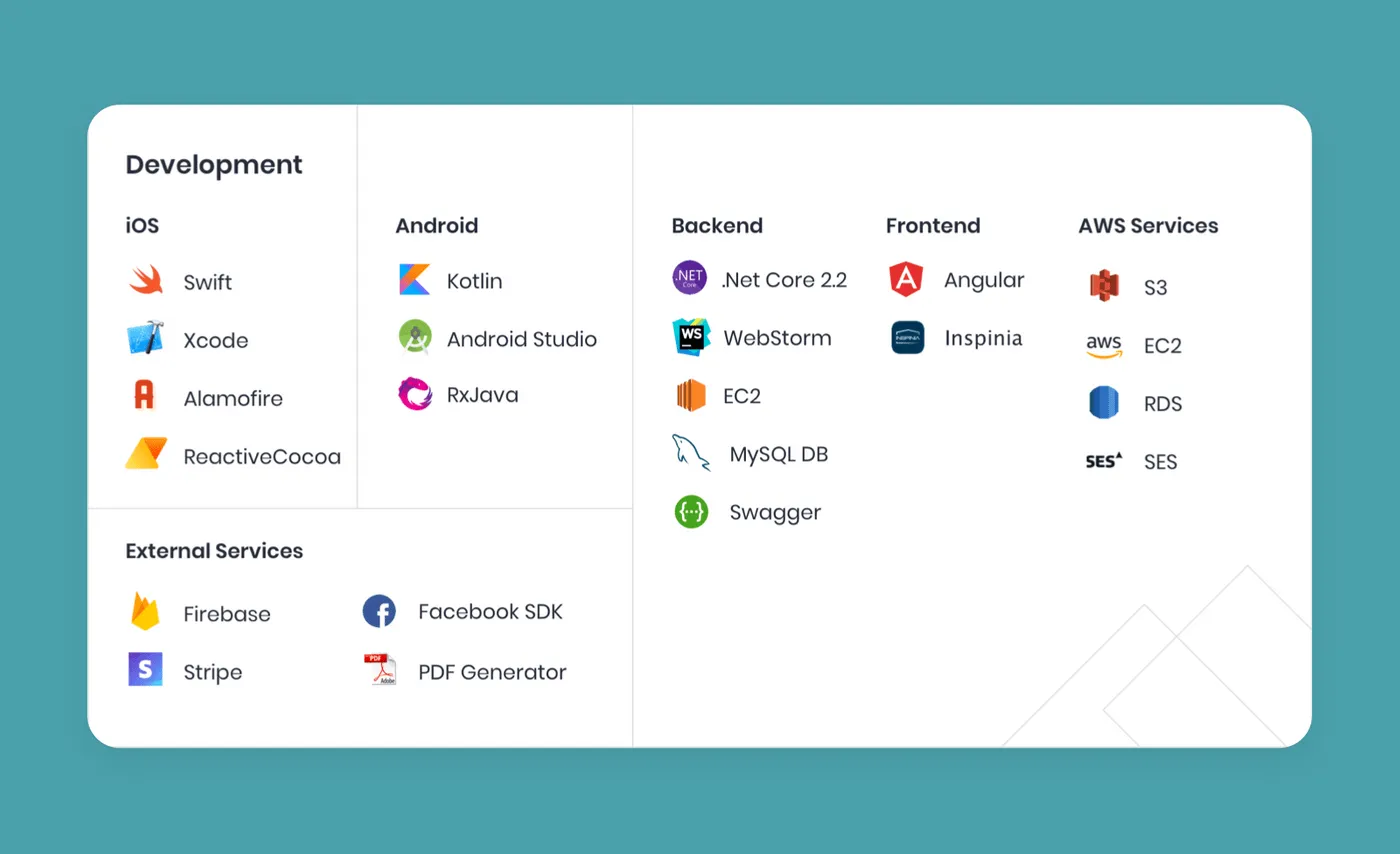
Occaz project tech stack
Project Challenges
Occaz was both a prominent project and sometimes a challenging one. Here’s what we’ve faced working on the app:
- Server architecture
The task was to help our clients create and configure a reliable development environment. Considering that there may be a need to distribute web content around the world in the future.
We knew the project could need a global content delivery network, which Amazon already had (CloudFront). One more reason for choosing Amazon Web Services is its scalability and load balance automation.
Learn more about Occaz AWS architecture and what services we used to maintain it in a separate article on this topic.
For Occaz, we used the following AWS services:
- Elastic Compute Cloud. For dynamic infrastructure scaling and increasing server capacity on the go.
- Relational Database Service. To scale quickly and adapt to emerging loads
- SES. An email sending service.
- Simple Storage Service. For storing objects.
- CloudWatch. To keep an eye on metrics like CPU load and number of database connections.
- Simple Notification Service. To get warned about atypical loads and respond to them.
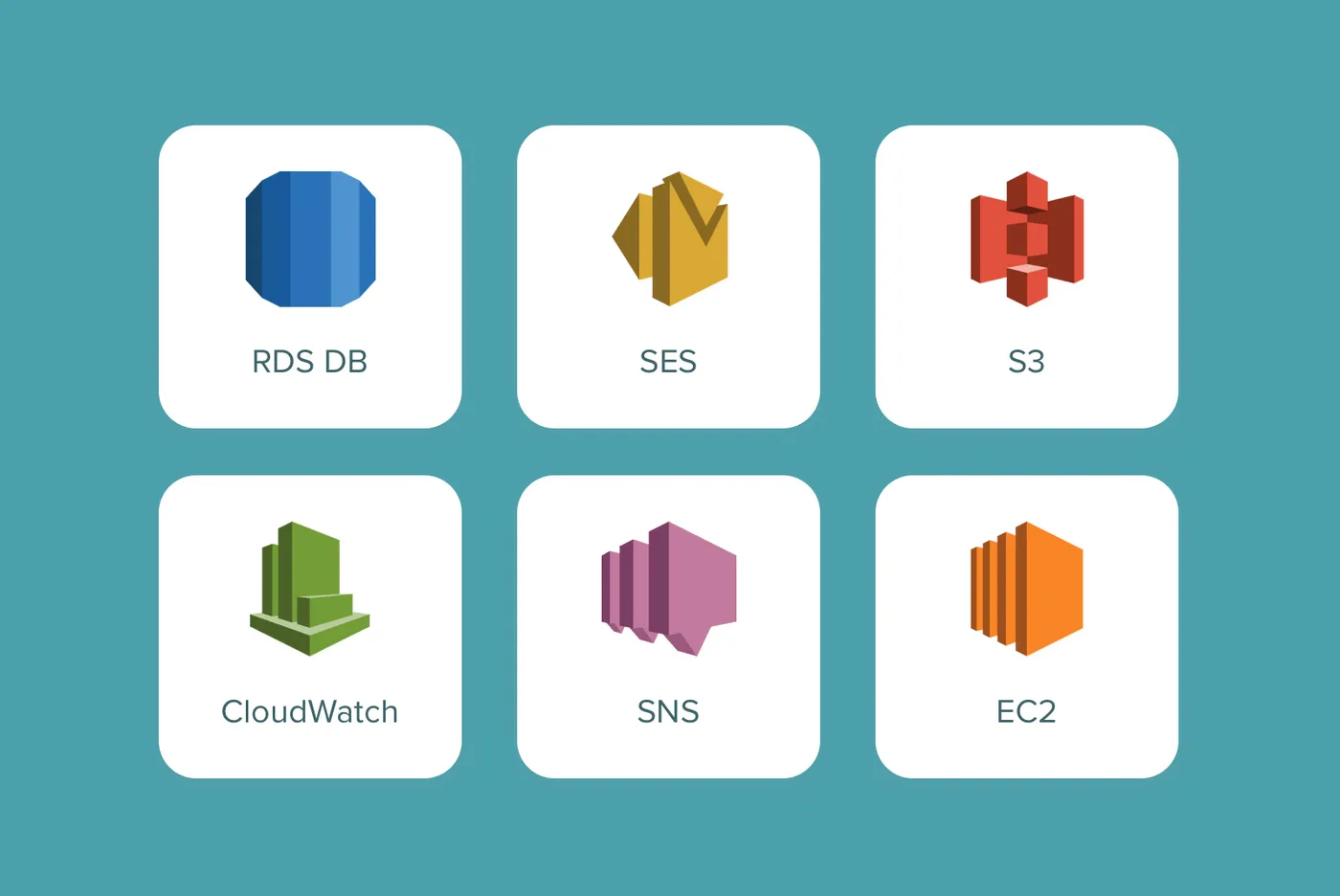
AWS services we used for Occaz app
- Sophisticated reporting system
Occaz has a complex system of reports based on the user’s answers during the car inspection.
Users need to answer several questions about the vehicle and its condition in six categories (documents, car interior, motor, and others). These questions can have multiple answers, and there’s an overall score calculated for each category.
Since there are many questions, a few categories, and several calculation formulas, it was easy to miss some details.
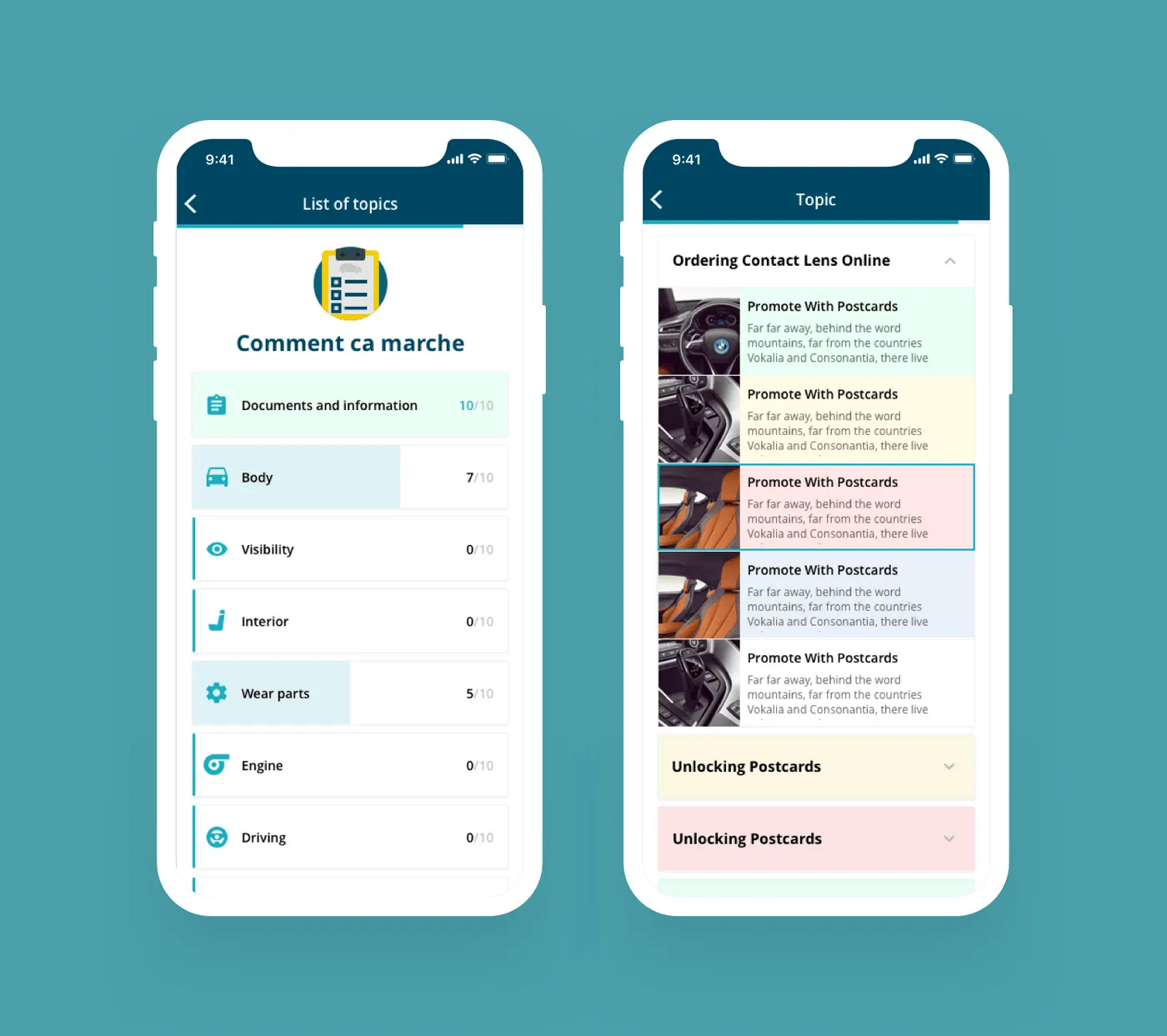
Car inspection report in Occaz
To prevent that, our Project Manager created a detailed and substantive documentation for the development team, making it hard to miss anything. By referring to the guide, we successfully implemented the reporting feature and made sure it worked as expected.
- Template generation
To make the app more convenient, we've added a template generation feature. Users create custom reports in the form of a PDF file with the information about their vehicle. The generated PDF file can then be sent to their email address.
To make it work, we've integrated an external PDF generating service and used Amazon Simple Email Service (SES).
Our clients were always in touch with the team, which greatly helped us. Gathering feedback and making required changes took much less time than usual:
Dmitriy Krivosheya
Project Manager
During all the project phases our clients have been very responsive, caring and delivered the immediate and valuable feedback in great detail in little to no time, which allowed us to focus solely on application development and problem-solving.
The Finish Line: Project Results
Within a year, Occaz platform returned the investment and became a profitable business. The app had 10,000 users in the first month and was downloaded more than 100,000 times in total. It has a 4,6 rating on the App Store and 4.2 on Google Play.


With the help of the apps we've created, our clients automated the process of collecting data from users. Now, Occaz users can draw up documents without making a call or visiting an office.
In turn, automation increased the flow of customers and the number of requests. It also significantly expanded the marketing channel for selling our clients’ services.
To grow the app further, our clients want to increase their marketing effort. Future plans include installing tablets with the Occaz app in places popular among drivers like gas stations, paid parking zones, etc.

Evgeniy Altynpara is a CTO and member of the Forbes Councils’ community of tech professionals. He is an expert in software development and technological entrepreneurship and has 10+years of experience in digital transformation consulting in Healthcare, FinTech, Supply Chain and Logistics
Give us your impressions about this article
Give us your impressions about this article



